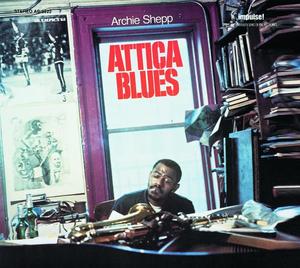
Attica Blues
conducted by Romulus Franceschini; performed by Archie Shepp, 1937- (Verve Records, 2003), 37 mins
Details
- Field of Interest
- Jazz
- Conductor
- Romulus Franceschini
- Content Type
- Music recording
- Duration
- 37 mins
- Format
- Audio
- Sub Genre
- Free Jazz
- Label
- Verve Records
- Performer
- Archie Shepp, 1937-
- UPC (Physical)
- 00602465441420
- Date Recorded
- 1972-01-24
- Release Date
- 2003-03-11
- Review
- Refining his large-ensemble experiments of 1971, Attica Blues is one of Archie Shepp's most significant post-'60s statements, recorded just several months after authorities ended the Attica prison uprising by massacring 43 inmates and hostages. Perhaps because Shepp's musical interests were changing, Attica Blues isn't the all-out blast of rage one might expect; instead, it's a richly arranged album of mournful, quietly agonized blues and Ellingtonian swing, mixed with a couple of storming funk burners. Of course, Shepp doesn't quite play it straight, bringing his avant-garde sensibilities to both vintage big band and contemporary funk, with little regard for the boundaries separating them all. His soloing on tenor and soprano is typically sharp-edged and modal, and his nasal, slicing tone on soprano is featured quite heavily. The stylishness of the slow numbers is undercut with quivering, faintly unsettling dissonances, and the up-tempo funk cuts recall the way Sly Stone's arrangements ping-ponged many different elements off each other in a gleeful organized chaos. That's especially true on the gospel-inflected title song, a monster of a groove that later became a hit on the acid jazz revival circuit (and stands up to anything recorded by straight-up funk bands of the era). In the same vein, "Blues for Brother George Jackson" sounds like an edgier Isaac Hayes-style blaxploitation soundtrack cut. Vocal ballads are plentiful, and Joe Lee Wilson ("Steam," a song Shepp would return to often) and Carl Hall (aka Henry Hull) both acquit themselves well; more debatable are the poetic recitations and the choice of flügelhornist/composer Cal Massey's young daughter Waheeda to sing "Quiet Dawn" (although Waheeda's almost-there intonation is effectively creepy). Still, in the end, Attica Blues is one of Shepp's most successful large-group projects, because his skillful handling of so many different styles of black music produces such tremendously groovy results. ~ Steve Huey, All Music Guide
- Subject
- Jazz, Music & Performing Arts, Free Jazz, Free Jazz, Jazz Libre
- Keywords and Translated Subjects
- Free Jazz, Jazz Libre
